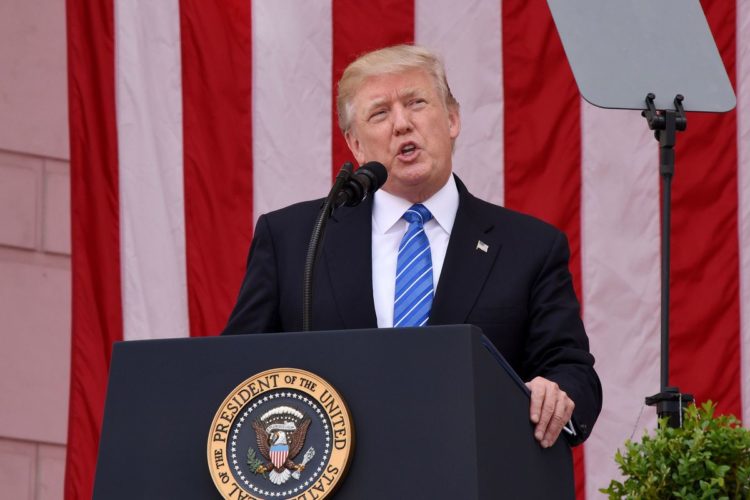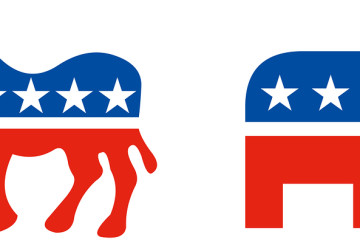Trump Pledges Harvey Aid With Congress Pressured to Speed Relief

published Aug 28, 2017 3:59:30 PM, by Erik Wasson and Jennifer Epstein
(Bloomberg) —
President Donald Trump said that he expects Congress to swiftly pass emergency disaster funding to respond to Hurricane Harvey in Texas, even as signs of a political fight over the money began to emerge.
“You’re going to see very rapid reaction from Congress, certainly from the president,” Trump said at a news conference Monday. “You’re going to get your funding.”
“The real number, which will be many billions of dollars, will go through Congress,” he added. “It will happen very quickly.”
GOP leaders haven’t committed to any specific timetable yet for a debate on Harvey relief. Trump said Monday he expected a formal request to come shortly.
As the scale of damage from the storm became apparent, Texas Democrat Sheila Jackson Lee said she will draft a “robust” relief measure to be added to a spending bill on the House floor next week.
“We will need to put together an emergency supplemental appropriations bill,” Republican John Culberson, a senior member of the House spending panel who represents Houston, said in a Bloomberg Television interview. “No one could have ever predicted or expected a catastrophe of this magnitude to descend on the Houston area.”
‘Timely Relief Bill’
Culberson was joined by House Minority Leader Nancy Pelosi of California in calling for a bill. Pelosi made clear that any bill should be exempt from budget caps that require offsetting spending cuts.
“Republicans must be ready to join Democrats in passing a timely relief bill that makes all necessary resources available through emergency spending,” Pelosi said in a statement.
A spokeswoman for House Speaker Paul Ryan of Wisconsin, AshLee Strong, said Congress “will help those affected by this terrible disaster.”
“The first step in that process is a formal request for resources from the administration,” she said.
A top House conservative, however, suggested he wants to cut spending to pay for a response to Harvey. “It’s a little early to say, but I have no doubt in the size of the federal budget we have we can find lower priority spending to help the people of the Gulf Coast who have been adversely impacted by this tragedy,” said Jeb Hensarling, a Texas Republican and chairman of the Financial Services Committee.
Additional Funds
So far, the Trump administration hasn’t determined whether additional funds will be needed, acting Homeland Security Secretary Elaine Duke said Monday on Bloomberg Television. She said if additional funds are needed, the Department of Homeland Security will work with Congress to obtain them.
Trump is taking pains to show himself actively engaged in the federal response to Hurricane Harvey as he faces the first major natural disaster of his presidency with his popularity at an ebb. He said he has been in frequent contact with the Republican governor of Texas, Greg Abbott.
The president and First Lady Melania Trump plan to fly to Texas on Tuesday even as Harvey, now a tropical storm, continues to deluge the region. An airspace restriction issued by aviation authorities suggests Air Force One will land in Corpus Christi, away from the worst ongoing flooding in the Houston region.
A House Republican aide said that the Federal Emergency Management Agency has sufficient, disaster relief funding for now. FEMA said it has $3.3 billion in the disaster relief fund as of Monday, which includes funding that can be shifted from longer-term priorities. Costs associated with Harvey are “quickly drawing down the remaining balance” in the fund, said Stephanie Moffett, a FEMA spokeswoman.
A deluge of rain and rising floodwaters has left Houston immersed. Tropical Storm Harvey, which made landfall as a category 4 hurricane, has drifted back toward the Gulf of Mexico and is poised to regain strength before crashing ashore again, this time on the Texas-Louisiana border.
Harvey’s cost could reach $30 billion when including the impact on the labor force, power grid, transportation and other elements that support the region’s energy sector, Chuck Watson, a disaster modeler with Enki Research, said in an email Monday. That would place it among the top eight hurricanes to ever strike the U.S. David Havens, an insurance analyst at Imperial Capital, said the final tally might be as high as $100 billion.
Vice President Mike Pence said that as many as a half-a-million people may be ultimately eligible for assistance.
Adding a Harvey spending bill onto Congress’s busy September agenda could affect efforts by Republican leaders to pass a stopgap spending bill by Sept. 30 to prevent a government shutdown and to raise the nation’s debt ceiling.
Funding for Harvey relief, for example, could be used to win the votes of the 36-member Texas House delegation for a stopgap spending bill or a debt limit measure.
Republican Divide
The Republican Party, however, has been divided in the past over whether disaster spending needs to be offset by other domestic spending cuts, a debate that could return over Harvey response funding.
Both of the Republican senators representing Texas, John Cornyn and Ted Cruz, voted against a $50 billion Superstorm Sandy spending bill in early 2013 after pushing for spending cuts to be attached. Cornyn and Cruz say they voted “no” in the end because of unrelated spending attached to the package.
Representative Peter King, a New York Republican, lashed out at Cruz on Twitter Saturday over his Sandy vote.
“Ted Cruz & Texas cohorts voted vs NY/NJ aid after Sandy but I’ll vote 4 Harvey aid. NY wont abandon Texas. 1 bad turn doesnt deserve another,” King tweeted.
A conservative push to stop any Harvey aid that adds to the deficit could also complicate a GOP push later in the year for steep tax cuts that add to the deficit.
Congress may also decide to provide a quick down payment on hurricane relief, followed later by a more comprehensive package. In 2005, Congress approved $10 billion in immediate Hurricane Katrina aid while most members were still on August recess. A $51 billion follow-up package was approved months later, after House conservatives, including Pence, fought unsuccessfully for spending cuts to offset the cost.
Pence on Monday told KHOU-TV in Houston that the White House is “very confident that the Congress of the United States is going to be there to provide the resources necessary,” to help Texas recover. He didn’t mention spending cuts.
–With assistance from Elzabeth Dexheimer, Anna Edgerton and Justin Sink (Bloomberg) and Jack Kingston (Bloomberg BNA).To contact the reporters on this story: Erik Wasson in Washington at ewasson@bloomberg.net ;Jennifer Epstein in Washington at jepstein32@bloomberg.net To contact the editors responsible for this story: Kevin Whitelaw at kwhitelaw@bloomberg.net Justin Blum




No Comment